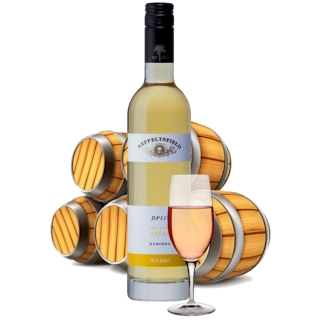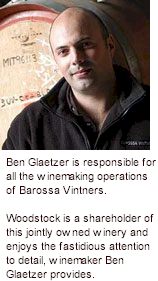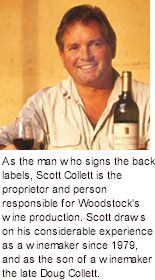


As a reconnaissance and fighter pilot in Spitfires, Hurricanes and lighter aircraft, Doug observed the vast vineyards of Europe and developed an interest in wine. After studying Oenology at Roseworthy Agricultural College after the war, Doug soon took charge of Australia's biggest winery at Berri in South Australia's Riverland. Doug developed a special regard for the McLaren Vale region, its climate, natural beauty, its full-bodied wines and their rich middle palate flavour.

The Collett family bought the Woodstock property in 1973 and quickly built a modest winery crushing its first vintage in 1974. Doug and Mary Collett's middle son Scott took over at Woodstock in 1982 after gaining a winemaking degree and varied winemaking experience in Australia, Europe and California.
Scott started the " Woodstock" brand in 1983 by releasing selected premium wines under the Woodstock label. Tasting success, Scott increased production and sales and in 1988, Scott and Anne Collett purchased neighbouring vineyards and built the Coterie. The aim now at Woodstock is for modest grape crops ripened to perfection to maximise flavour. Control is the key and the aim is quality not quantity. Integrated pest management is practised in the trend towards organic viticulture.
" ..to create and preserve the best flavours in generous, value for money wines. This starts in the vineyard and finishes in the wine glass and requires attention to detail at every stage"

The Angas Vineyard manager John Pargeter is a true innovator who utilises and adapts any available technology to assist his task of creating the best grape flavours possible. Grape quality is controlled by managing crop levels, (grape size, bunch weight and bunch numbers) and vigour of the vines. Canopy management controls size and density of each vine's foliage.
Shareholder Rocco Melino and staff commenced planting the Wirrega Vineyard in 1994 with the help of shareholder and viticulturist Geoff Hardy. Rocco's son Gino Melino became the manager of Wirrega Vineyard in 1999. As a director of Wirrega Vineyards, Scott Collett regularly visits the vineyard and monitors management through the seasons with fellow directors. The dividend Woodstock receives as a shareholder of Wirrega Vineyards is in the form of quality grapes for premium winemaking. As a small, red fermenting winery, Woodstock worked efficiently for 26 vintages. However, as grape tonnages grew and as Cellar Door and The Coterie visitor numbers grew, the winery became harder to run efficiently as a fermentation cellar.
Rather than destroy the big gum trees and natural ambience of Woodstock, the efficiency of a larger scale winemaking facility was preferred. Barrel storage, warehousing and finished wine distribution will continue at Woodstock, while the glorious Woodstock wines are now crafted at the Barossa Vintners facilities. Doug Collett left many barrels of lovely old fortifieds at Woodstock. Scott will continue to discover and bottle these fine old tawnys in future years.
Established collectively by experienced winemakers in 1995, Barossa Vintners is a flexible, efficient winery capable of making many different styles for its winemaking shareholders. Barossa Vintners itself does not own any wines, and is not a co-operative. It provides a winemaking service for shareholders and clients. The involvement of Barossa prince winemaker ben Glaetzer ensures the operation is always at the cut and thrust of sophisticated viniculture.
